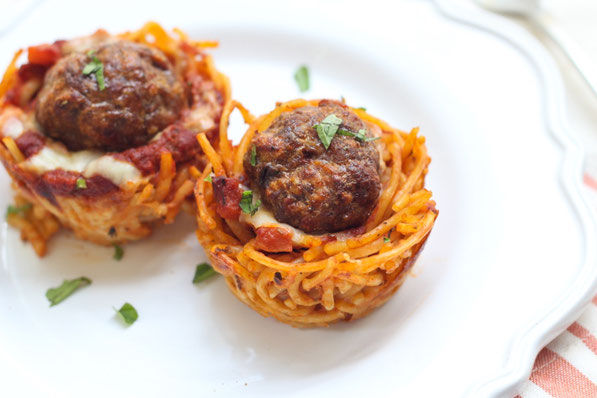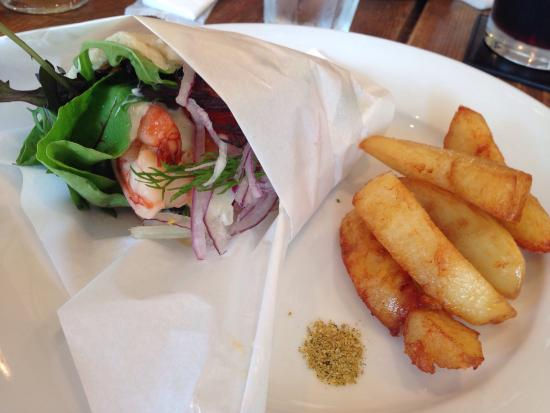It's never the same
- Sep 1, 2019
- 6 min read

Tonight we are eating spaghetti and meatballs with my son and family to celebrate Father's Day, which combined with a couple of things I read yesterday and today, have inspired today's blog - the subject of which is why one dish can take so many different forms - even if it's the same person - namely you - cooking it.
Looking for pictorial inspiration I found the above, which is certainly a very different version of spaghetti and meatballs - about which I have blogged a long time ago I think. It's a family favourite and not authentically Italian. And no we shall not be eating spaghetti and meatballs like those above, but it is a perfect example of how much one can deviate from an original idea.
Moreover my son's version is not like mine, and mine is never the same anyway. It depends on what I have in my fridge - as always. I might have some leftover gravy which might go into the tomato sauce. The tomato sauce can be made from tinned tomatoes (which brand?), garden grown (mine or Monika's and which variety anyway?), supermarket or market tomatoes in and out of season, boosted with whatever wine is left over from the weekend and whatever herbs are available from either the garden a jar or the supermarket. The meatballs too are usually made from beef, but every now and then I add a bit of pork or veal as well, and the soaked breadcrumbs that are added to lighten them could be from any number of different types of bread. The variations are endless really. And that's just the ingredients. How long did I cook it for, did I make it the day before and reheat it? Did I fry the meatballs first? And if I really wanted to experiment I could make a quite different sauce in which to cook the meatballs - a creamy mushroom one perhaps.
What really inspired this post though, was the following from the preface to Claudia Roden's Mediterranean Cookery in which she encourages you to have faith in yourself.
"Use the measures, temperatures and timing as a guide but do not abandon your judgement, initiative and good sense and above all, your taste. It is impossible to give foolproof measures and instructions which cover every eventuality. You may have several things in your oven at the same time so that some of the shelves may not receive very much heat. A very large lemon could have little juice, or it may have plenty but not be sharp at all. Your garlic may be young or old, your aubergine bitter or not. Nature is like that. What is sharp or spicy or delicate for me may not be so for you; we all have different ideas about what is crisp or golden or brown so it is unlikely that your dish will turn out exactly like mine or even that it will come out exactly the same each time. But it is precisely that personal touch, that knack for doing things which is what cooking is about." Claudia Roden
She gives the example of being told that it was impossible to write down a recipe for a particular dish:
"when I asked people to explain how they cooked they always protested that it was impossible to do, and that I had to watch them and taste. On one occasion in Morocco the husband exclaimed: 'How could you possible communicate in words what my wife has learnt from her mother and her relatives and their cooks, and which she has perfected over fifty years of cooking?' But you can, and if the results are not exactly like this wonderful lady's, they can still be splendid."
It also depends on the recipe you settle on to teach you how to cook something classic. As we have seen, there are almost endless ways of dealing with something as simple as flour and water, so the choice you make is personal and may simply have been influenced by some masterful photography and food styling, or the writer's gift of the gab. Some recipes are very precise. Some are vague in the extreme - a handful of this, a handful of that, cook until it is done ... And if, as sometimes happens you somehow miss a step along the way or an ingredient, then indeed your dish will be different. But not necessarily any the worse for that. After all some of the most famous dishes are supposed to be the result of a mistake - tarte tatin for example.
As Claudia Roden says, there are an infinite number of variable really that will influence the final result but you will learn along the way. Well she certainly hopes you will.
"my hope is that when you have used the book for some time you will be able to conjure up a meal with a Mediterranean flavour with whatever is in the house and without feeling bound to a recipe." Claudia Roden
I probably could - just from reading her, Elizabeth David and Robert Carrier, plus visits to France and a few other cookbooks I have. And I certainly have learnt along the way about all manner of food, from all those wonderful cooks who have written such magnificent cookbooks, and which I am trying to share with you, and also, of course, from my mother, and the wonderful French who invited me into their homes and taught me the French approach to food - critical, intellectual, appraising and always curious.
So as my approach to various dishes has changed over the years, so have the cuisines of the world changed in response to the waves of immigration and the increase of trade that has introduced exotic ingredients from faraway places. And this is where my second piece of writing comes in. I am still working my way through Pasta Pane Vino by Matt Goulding which I mentioned before in my post on burrata. This bit of inspiration came from his chapter on Sicily which has, of course, in recent times had a huge influx of immigrants from North Africa. Sicily itself has been conquered many times over the centuries and ruled by virtually everyone from the Romans, through to the Arabs and the Normans in between as well as many others along the way. Which has resulted in a particularly Sicilian fusion of tastes and ingredients, not seen elsewhere in Italy. Sicily seems to be embracing this latest invasion - at least in one particular trattoria in Palermo where the Afghan cook is taking the best from all worlds.
"He also cooks Sicilian classics caponata, pasta con le sarde, arancini - the kinds of dishes whose flavours originally migrated across the Mediterranean, But here in Ballarò, the flavours begin to bleed into one another - the sardines in the pasta get a hit of chilli, the slow-braised vegetable curry is enriched with Parmesan, the béchamel in the moussaka is lightened to better match Palermo's steamy climate. 'I've learned all the Sicilian classics, but I like to put my own twist on them." Matt Goulding
But conservative, nationalistic (at least when it comes to food) Italy is not so sure.
"In response to the surge of immigration and the rise of tourism cities have begun to enact laws to 'protect tradition and Italian cultural typicality', as one new ordinance in Verona reads. There, as in Venice, the government has banned kebab shops and other 'takeaway ethnic foods.' As of 2016 seventy percent of food sold in Florence's city centre must be 'local food.' ... Culinary nationalism is nothing new, but both the tidal wave of immigration and the enduring pride in unembellished Italian food will challenge the country's kitchen landscape for years to come." Matt Goulding
I have spoken before about the clash of cultures when it comes to food - or rather the merging of cultures. Over the centuries massive changes have been wrought by conquerors, immigrants, trade and experimentation. Today in the restaurants of the cities of the world, and in smaller outposts too, chefs experiment with tradition and create new and challenging ways to prepare such simple things as fish and chips.

And on the streets we are being presented with new and exciting tastes. The supermarket shelves reflect the particular cultural mix of the immigrants to that country - here it is largely Asian, in France it is North African - couscous is now a national dish. But Italy is a very conservative country when it comes to food. There are rules. It will be interesting to see how it develops. After all 'local food' may mean something completely different to what it is now if certain small districts and towns become largely African. I suspect the immigrants will win and there will be new and exciting ways with pasta before too long. But it will be alongside the traditional - that will be around for a very long time to come. And they do say spaghetti and meatballs is an American dish anyway - well American created by its Italian immigrants. Go figure.












Comments